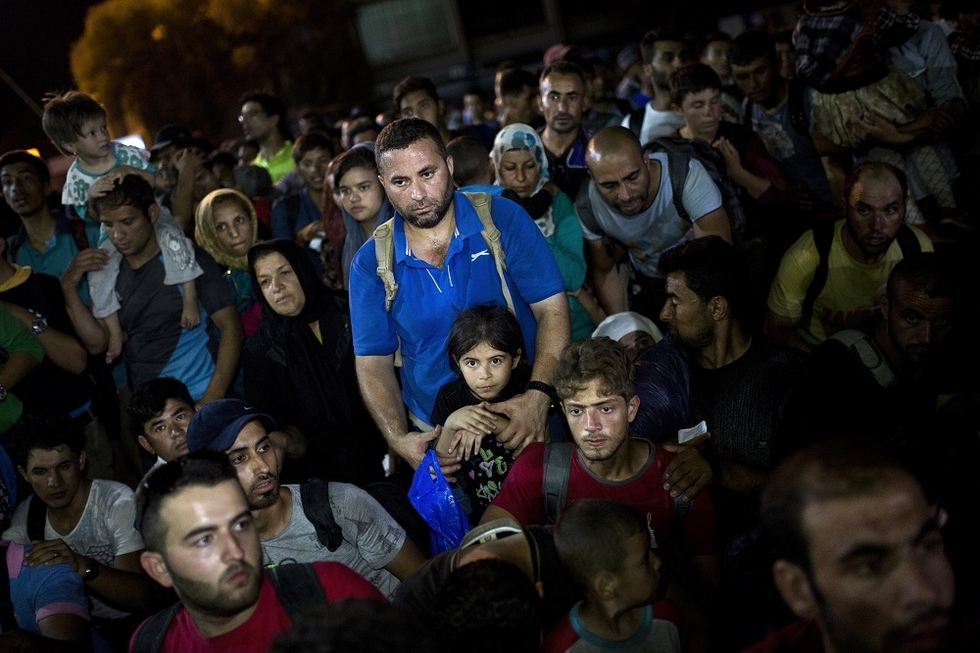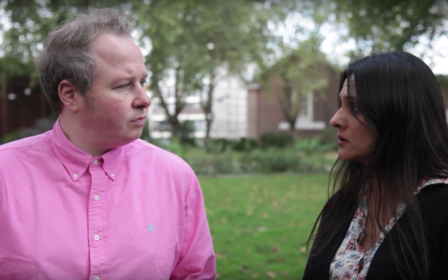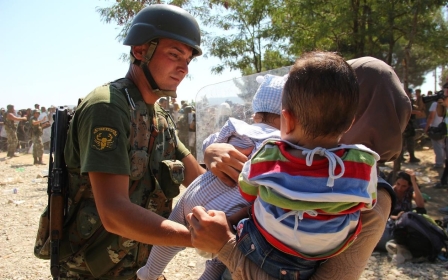Clashes hit Greece as EU chief says refugee 'exodus' to last years

Fresh clashes erupted between police and refugees and migrants on the Greek island of Lesbos on Tuesday, as the refugee crisis continued to intensify across Europe.
Authorities on Lesbos said that they were "on the verge of explosion," after a dozen or so coastguards and riot police tried to fight back crowds of some 2,500 migrants and refugees with batons.
The refugees were trying to surge forward and board a government-chartered ferry bound for Athens.
"I stayed here eight, nine days - oh my God, I can't even remember," said Aleddin, an engineering student hoping to join his brother in Germany, as he languished in Lesbos.
"Some people have been here for 14 or 15 days. The government doesn't care," he told AFP.
Over the past 24 hours, Greek coastguard have picked up 500 people in boats at sea, AP reported.
According to the latest UN figures released on Tuesday, there are now 20,000 mainly Syrian refugees on the island that is normally home to some 80,000.
The clashes come a day ahead of the unveiling of a key EU policy proposal which is believed to advocate for the resettlement of 120,000 refugees by various EU states.
The number is nearly half the number of people that the UN has called in recent days for EU member states to take in at a minimum.
"A very preliminary estimate would indicate a potential need to increase relocation opportunities to as many as 200,000 places," UN High Commissioner for Refugees Antonio Guterres said in a statement late last week. "Solidarity cannot be the responsibility of only a few EU member states."
European Commission chief Jean-Claude Juncker proposed the EU's new plan, which will be discussed on Wednesday, in order to relieve overstretched countries such as Greece and Italy.
Merkel welcomed the plan and called it "a first important step".
"There is another step that needs to be taken because neither Germany nor Sweden can determine the number of refugees given that it stems from the situation (on the ground)," said Merkel after talks with Swedish Prime Minister Stefan Lofven on Tuesday.
"We need an open system to share out those with a right to asylum," she added.
Coming exodus
However, it is unclear if even this wide-ranging deal - which seems to have won the backing of key members Germany and France – will be able to remedy the crisis with EU President Donald Tusk on Tuesday warning that the refugee "exodus" could last for years to come.
"The wave of migration is not a one-time incident but the beginning of a real exodus, which only means that we will have to deal with this problem for many years to come,” Tusk said.
The UN's top official in charge of migration said Tuesday that the crisis rocking Europe needs a "global response", insisting that countries worldwide must be asked to do their share.
Germany has led the charge so far saying that it can take some 500,000 refugees annually for the next few years. Britain on Monday said it would take in some 20,000, an announcement that sparked controversy with some critics saying that mainly children would be admitted and that they would be subject to deportation upon turning 18.
Tusk said that the "exodus" meant Europe had "to learn how to live with it without blaming each other".
French President Francois Hollande also warned the core ideal of open borders within the EU was at stake.
"If there is not a united policy, this mechanism will not work," he said, referring to the passport-free Schengen zone across much of the continent.
Merkel, whose country is Europe's top refugee destination, hailed as "breath-taking" the warm welcome given to the more than 30,000 migrants who arrived there over the weekend.
Stay informed with MEE's newsletters
Sign up to get the latest alerts, insights and analysis, starting with Turkey Unpacked
Middle East Eye delivers independent and unrivalled coverage and analysis of the Middle East, North Africa and beyond. To learn more about republishing this content and the associated fees, please fill out this form. More about MEE can be found here.



